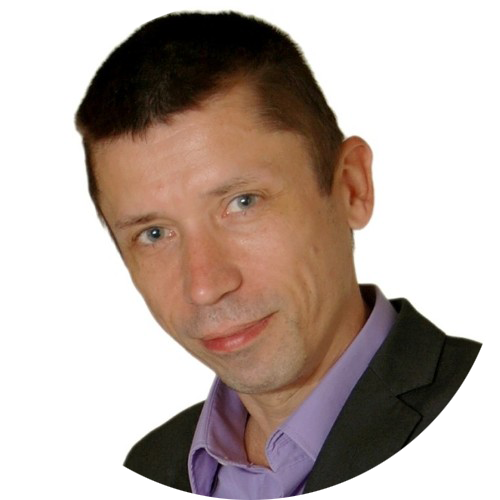What does it mean to work as an international leadership and development expert? What are the greatest challenges that our fast moving and quickly changing work environment comes with? Today, Marcin Swierkocki, international HR business consultant will give us his insights into international leadership development and provides interesting answers to these and other questions.

About the interview partner
Marcin Swierkocki works as an HR business consultant who has specialized in L&D, change- and project management. He brings over 25 years of international experience in change management and operational development with him. His personal motto is influenced by Viktor Frankl: ‘Between stimulus and response there is a space. In that space is our power to choose our response. In our response lies our growth…’. His personal inspiration comes from his optimistic and positive character and by draining the energy that successfully supporting others gives him.
According to your opinion and experience: What are currently the biggest challenges for Polish organizations when it comes to leadership and how do they solve them?
The biggest challenges are related to two topics, on the one hand increasing costs of labour as this is governmentally regulated and together with this a lack of qualified specialists, thus companies recruit a lot of foreigners, e.g. Ukrainians, and far south-east nationalities in order to be able to fulfil the e.g. production orders.
The other faced issue by managers is related to transforming a company from a small one to a medium sized company. This involves having a different mind-set and acquiring new competencies related to management.
How do, from your point of view, companies in Poland view leadership development at the moment and how do you think will this view develop in the future?
Some companies, especially the ones in the IT sector are open to new trends, e.g. teal (turquoise) style of management. There is also a need to properly manage a team which is distributed because of scope of projects, home office style of cooperating, or global projects and their limited capacity of individuals to stay alert and available. If some managers achieve the above, it seems that their worldview is open, tolerant and they do expect partnership and they do take care of work-life balance for their employees.
You have been working as an international trainer and coach for many years. According to your experience: Are there any differences in leadership development between Poland and other countries/continents?
Yes, there are. In my eyes, leadership and the style that you use is dependent on your business environment, governmental regulations, market maturity and your own personal traits. How I do perceive the Western style of leadership, it is – more clear, straight, however more strict and predicable for the managed people. From the perspective of an employee – this gives him/her some security which is not always present in locally managed companies where the arsenal of tools is limited to a preferred leadership style of the manager, and the predictability is not always here what causes a lack of security for the employees and the consequence is a lack of true involvement at your workplace.
As we all know international leadership development is a lot about intercultural awareness and empathy. For a training professional doing a leadership program in Poland: What would you as the expert recommend and are there important things he/she should pay extra attention to?
Stay open to others, to their ideas, and switch from micro-managing tasks/issues to leading others, so that they are allowed to grow in their responsibilities.
What is the most challenging moment you have ever experience in an international training?
As I was raised in the US, I think the most challenging part for me is the local environment here in Poland. Managerial stubbornness and an “I-know-it-all”-style of communicating simply irritates me. This attitude should change, but in some managers their habits are so strongly integrated that they seem to be not reform able. But: With a proper coach and time given to the process there is some hope for a lasting change. 😉
Working internationally, by staying open I did enjoy this. I do see differences by working with various nations, e.g. French are different to Dutch managers, even in the DACH region I could perceive differences in this how Austrians cooperate with Germans or Swiss managers, however I would not like to generalize here. The good thing is, the more you grab intercultural experience, the more open you become to others. In my eyes this becomes one of your attributes to become successful with people.
Working on an international level always comes with the challenge of intercultural communication. How do you as an expert deal with these challenges and how do you prepare yourself for working with participants from different countries?
Most of the projects are run in English and I do not have a problem here at all. Moreover, like on any other project, the success is determined by a proper preparation, and there is a ‘must’ for me to understand the companies culture, organization, people (gaps in their skills or the skills that need to be acquired) and the systems in place. This can happen by both interviews and by TNA (training needs assessment questionnaires).

Since we live in a highly digitalized world and digitalization is almost in every part of our lives: What is your opinion on classical classroom, face-to-face, trainings? Will they vanish or do you think they will continue to exist and how?
F2F workshops will continue to be available. In terms of any social skills required they seem to be irreplaceable. The digitalized world is a trend and has its benefits, often saves time, is easily accessible, and is very good for technical trainings where you can verify the acquired knowledge. But we all know that even if you know it does not mean that you can use it. This can be verified in a class room in e.g. role plays.
How does the digitalization influence the leadership development industry in general? What effects of the digital transformation have you noticed in you work so far?
Nowadays information seems to be free, so in theory very often delegates know a lot before a class takes place. That is good however the easily accessible information doesn’t mean that you read or learn the right things. Like in our life, there are many so called gurus who are not credible.
As knowledge seems to be available, F2F classes are not anymore 3 days in a row, they are 2 or 1 day sessions focused on practicality.
According to your opinion: What will be the biggest challenge for the training & development industry in the next 5 to 10 years?
As nowadays I am located in Poland, I can only refer to this what I can see here. The Polish T&D industry should keep on developing. L&D development seems to be more accessible and the benefits which were so far visible for global and international players seem to attract as well the SME enterprises. If their budgets will stay realistic, I am feeling not only optimistic but as well enthusiastic.
Thank you Marcin for these exciting insights 🙂 Happy development!

